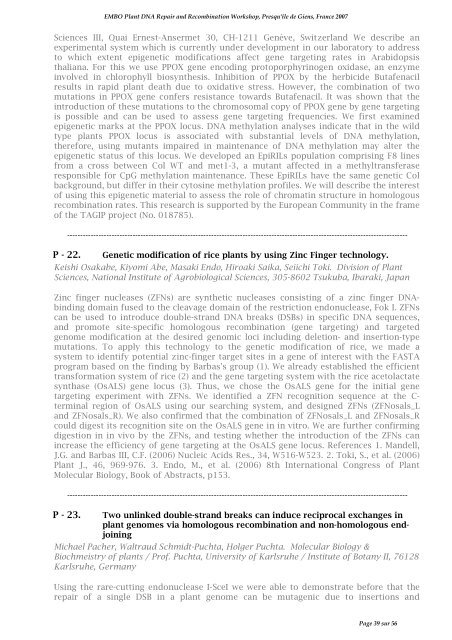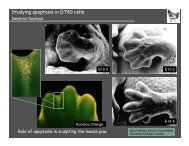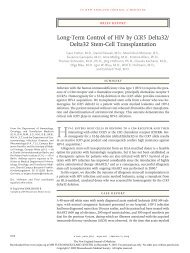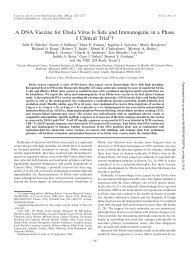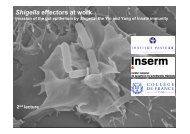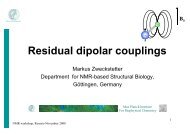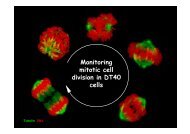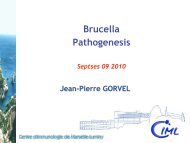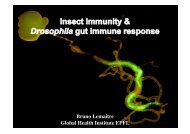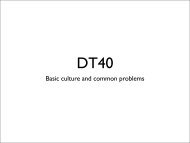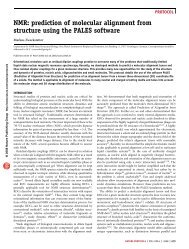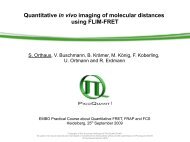pdf file - Events - EMBO
pdf file - Events - EMBO
pdf file - Events - EMBO
Create successful ePaper yourself
Turn your PDF publications into a flip-book with our unique Google optimized e-Paper software.
<strong>EMBO</strong> Plant DNA Repair and Recombination Workshop, Presqu'île de Giens, France 2007<br />
Sciences III, Quai Ernest-Ansermet 30, CH-1211 Genève, Switzerland We describe an<br />
experimental system which is currently under development in our laboratory to address<br />
to which extent epigenetic modifications affect gene targeting rates in Arabidopsis<br />
thaliana. For this we use PPOX gene encoding protoporphyrinogen oxidase, an enzyme<br />
involved in chlorophyll biosynthesis. Inhibition of PPOX by the herbicide Butafenacil<br />
results in rapid plant death due to oxidative stress. However, the combination of two<br />
mutations in PPOX gene confers resistance towards Butafenacil. It was shown that the<br />
introduction of these mutations to the chromosomal copy of PPOX gene by gene targeting<br />
is possible and can be used to assess gene targeting frequencies. We first examined<br />
epigenetic marks at the PPOX locus. DNA methylation analyses indicate that in the wild<br />
type plants PPOX locus is associated with substantial levels of DNA methylation,<br />
therefore, using mutants impaired in maintenance of DNA methylation may alter the<br />
epigenetic status of this locus. We developed an EpiRILs population comprising F8 lines<br />
from a cross between Col WT and met1-3, a mutant affected in a methyltransferase<br />
responsible for CpG methylation maintenance. These EpiRILs have the same genetic Col<br />
background, but differ in their cytosine methylation pro<strong>file</strong>s. We will describe the interest<br />
of using this epigenetic material to assess the role of chromatin structure in homologous<br />
recombination rates. This research is supported by the European Community in the frame<br />
of the TAGIP project (No. 018785).<br />
----------------------------------------------------------------------------------------------------------------------------------<br />
P - 22. Genetic modification of rice plants by using Zinc Finger technology.<br />
Keishi Osakabe, Kiyomi Abe, Masaki Endo, Hiroaki Saika, Seiichi Toki. Division of Plant<br />
Sciences, National Institute of Agrobiological Sciences, 305-8602 Tsukuba, Ibaraki, Japan<br />
Zinc finger nucleases (ZFNs) are synthetic nucleases consisting of a zinc finger DNAbinding<br />
domain fused to the cleavage domain of the restriction endonuclease, Fok I. ZFNs<br />
can be used to introduce double-strand DNA breaks (DSBs) in specific DNA sequences,<br />
and promote site-specific homologous recombination (gene targeting) and targeted<br />
genome modification at the desired genomic loci including deletion- and insertion-type<br />
mutations. To apply this technology to the genetic modification of rice, we made a<br />
system to identify potential zinc-finger target sites in a gene of interest with the FASTA<br />
program based on the finding by Barbas's group (1). We already established the efficient<br />
transformation system of rice (2) and the gene targeting system with the rice acetolactate<br />
synthase (OsALS) gene locus (3). Thus, we chose the OsALS gene for the initial gene<br />
targeting experiment with ZFNs. We identified a ZFN recognition sequence at the Cterminal<br />
region of OsALS using our searching system, and designed ZFNs (ZFNosals_L<br />
and ZFNosals_R). We also confirmed that the combination of ZFNosals_L and ZFNosals_R<br />
could digest its recognition site on the OsALS gene in in vitro. We are further confirming<br />
digestion in in vivo by the ZFNs, and testing whether the introduction of the ZFNs can<br />
increase the efficiency of gene targeting at the OsALS gene locus. References 1. Mandell,<br />
J.G. and Barbas III, C.F. (2006) Nucleic Acids Res., 34, W516-W523. 2. Toki, S., et al. (2006)<br />
Plant J., 46, 969-976. 3. Endo, M., et al. (2006) 8th International Congress of Plant<br />
Molecular Biology, Book of Abstracts, p153.<br />
----------------------------------------------------------------------------------------------------------------------------------<br />
P - 23. Two unlinked double-strand breaks can induce reciprocal exchanges in<br />
plant genomes via homologous recombination and non-homologous endjoining<br />
Michael Pacher, Waltraud Schmidt-Puchta, Holger Puchta. Molecular Biology &<br />
Biochmeistry of plants / Prof. Puchta, University of Karlsruhe / Institute of Botany II, 76128<br />
Karlsruhe, Germany<br />
Using the rare-cutting endonuclease I-SceI we were able to demonstrate before that the<br />
repair of a single DSB in a plant genome can be mutagenic due to insertions and<br />
Page 39 sur 56


